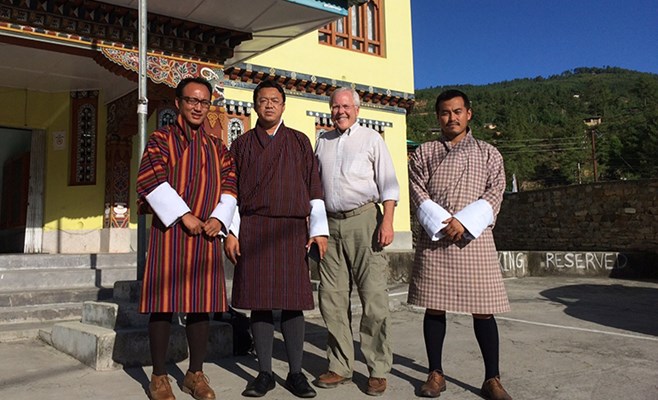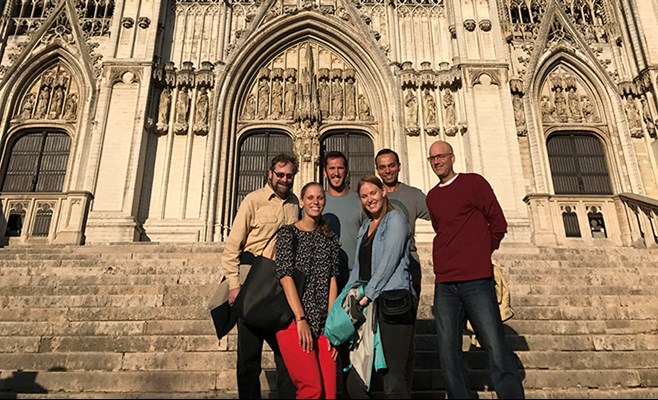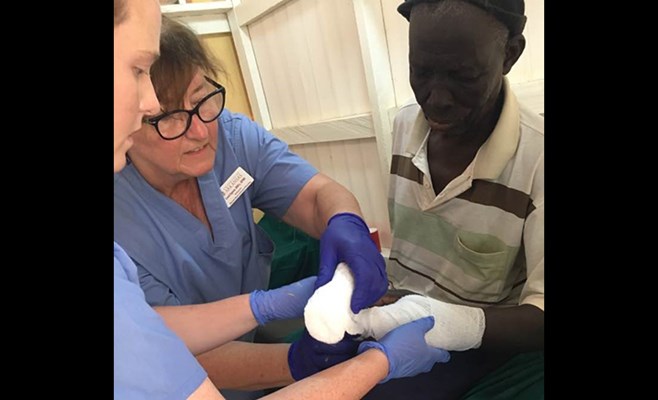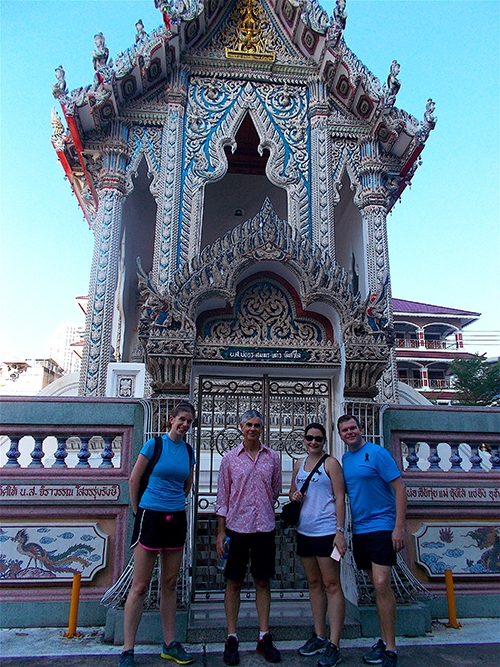Editor's note: This is one of a series of stories from the College of Education and Health Professions celebrating International Education Week at the University of Arkansas. See more at the Colleague news website. Visit the college's Facebook page this week for highlights on international faculty members.
Bill McComas could be called an extreme international traveler. The University of Arkansas science educator has visited 88 countries so far, well on his way to meeting his goal of 100.
McComas is one of several faculty members in the College of Education and Health Professions who use international travel to build connections, further knowledge in their disciplines, recruit students and foster additional exchange opportunities. Travel allows him to learn how science educators with different perspectives approach the field.
"If you only interact with people of one culture, you are very likely to miss interesting problems and solutions that others are investigating," said McComas, the Parks Family Professor of Science Education.
McComas will spend Thanksgiving in Singapore giving the keynote address for the Singapore Science Teachers Association. He travels frequently giving such talks, participating in research symposia and giving seminars, often as the guest of an education ministry or university sponsor.
"It's fascinating how one set of links generates another set of opportunities that have led to work in Ireland, Spain, Brazil, the UK, Greece and now Singapore," McComas said. "I have come to realize that, if we want to be a nationally known university, we must also be involved internationally. When other speakers are on stage at international events, it is vital that the UA be there, too, so that our institution can also be seen as a global player."
Some faculty connections overseas result in opportunities for students to travel internationally. Carol Agana, instructor of nursing, has gone many times over the past 10 years to Ghana in West Africa, where she has a home with her husband, John Agana, a Ghana native. Agana planned and organized a study abroad trip with 15 nursing students last summer, largely through her connection with the region. Her husband accompanied the group, paving the way for interaction with Ghanians.
The students helped deliver babies, demonstrated CPR, taught wound care, infant hydration and dental hygiene, attended a Ghanian wedding and saw elephants and other animals in the wild.
"We were not there to change things," Agana said. "We were going in to learn, especially about tropical diseases, and how the health-care system was similar to ours."
For years, Agana has also helped people of the village of Zaare in Bolgatanga, Ghana, sell the woven baskets they make. She has used proceeds to send books, clothing and medical supplies to the village. A traditional skill in the region, weaving enables the women to earn money to send their children to school as well as provide food and clothing for them.
Gary Ritter, who holds the Twenty-First Century Chair in Education Policy, is in Spain this week, presenting research with a former U of A employee who now works at Bath Spa University in England.
He began traveling internationally as a graduate student when he received a Rotary Fellowship to study for a master's degree in social policy at the University of Manchester in the United Kingdom.
"That convinced me studying overseas was a useful and productive experience," he said. "Of course, it is a particularly great experience to be able to attend school and live within another culture for many months. Nevertheless, even short trips to conferences are beneficial in that it can expose our faculty and students to scholars and research that we might not become familiar with otherwise - even with the internet."
Earlier this year, he and fellow faculty member Patrick Wolf attended a professional conference in Belgium with Department of Education Reform graduate students, who submitted proposals for research presentations through the same process as faculty members,
"These experiences are generally granted to graduate students who take the initiative," Ritter said. "They submitted proposals to the conference and were accepted, just like the faculty have to do. The only help we provide as the department is the guidance and the funding. For our program, it was good for bonding, building a cohort, and that's valuable. It also gives our students a bigger view of the world and how the kind of work they are doing fits in."
Erin Howie, an assistant professor of exercise science, searched online for a post-doctoral research position in physical activity after she earned a doctorate from the University of South Carolina. When Curtin University of Perth, Australia, showed up in the search results, she remembered joking with her dad about one day going to "the land down under."
"I was at a point in my life that it was a great time to travel and see the world, and they spoke English, which helped me," Howie said. "Australia is pretty advanced; there is a lot of funding in terms of exercise science, health and medicine. After the United States, it's the most research-productive county in those areas."
Since joining the Department of Health, Human Performance and Recreation faculty last year, Howie's international travel has been to professional conferences in Canada and Thailand. She continues to work with her faculty supervisor from Australia and collaborate with other researchers from all over the world — Ireland, South Africa, Singapore, among others — through technology.
"When you are studying in the U.S., everyone goes to the American College of Sports Medicine conferences," she said. "They are the end-all, be-all and very overwhelming. When I went to international conferences, I found more people who were interested in what I do. I think there are more opportunities for students if they are willing to reach out to help with social media. They can get experience by going to study with someone in another country for a few weeks. Often, the hosting university will help students with housing. You pay for travel. It's quite doable if you're willing."
According to the Graduate School and International Education, International Education Week is an opportunity to celebrate the benefits of international education and exchange worldwide. This joint initiative of the U.S. Department of State and the U.S. Department of Education is part of the University of Arkansas' efforts to promote programs that prepare students for a global environment and to attract future leaders from abroad to study, learn and exchange experiences in the United States. The week is observed Nov. 13-17 this year. A calendar of events is available online.
Topics
Contacts
Heidi S. Wells, director of communications
College of Education and Health Professions
479-575-3138, heidisw@uark.edu



